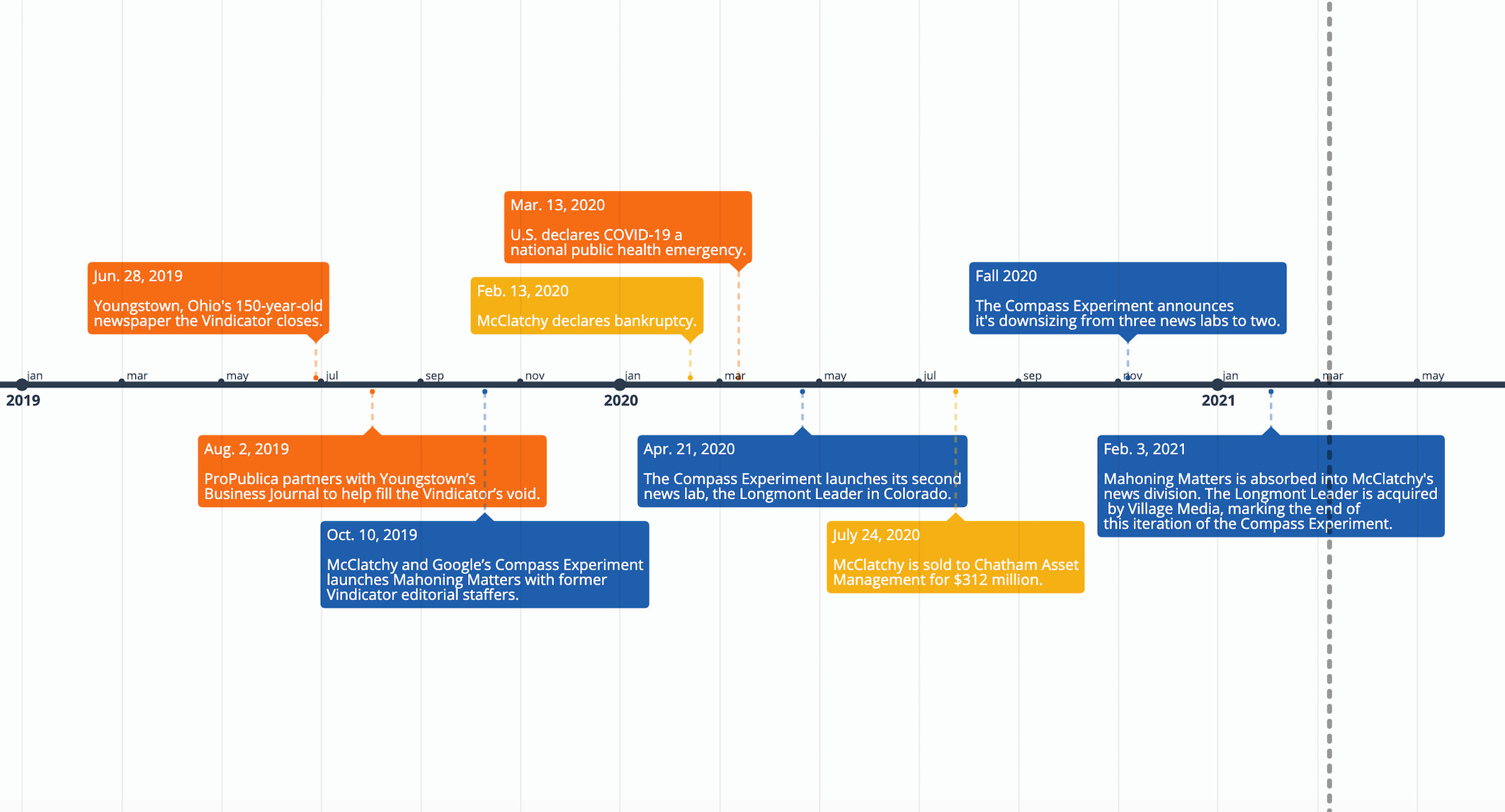Sign up for The Media Today, CJR’s daily newsletter.
An earlier version of this piece was featured in the Tow Center for Digital Journalism’s weekly newsletter.
In March 2019, Craig Forman, then McClatchy’s president and CEO, announced a new partnership with Google News’ Local Experiments project. Dubbed the Compass Experiment, its goal was to create three digital-only outlets in communities with little access to local news, with help from Google as a technology and innovation partner. According to Forman’s announcement, the Compass Experiment’s local news sites would be wholly owned and operated by McClatchy, a 163-year-old, family-run company that oversees dozens of newspapers. The project was to be funded for three years through the Google News Initiative, a wide-ranging endeavor that the company started in 2018 with a pledge to invest $300 million dollars over the course of three years to aid the ailing news industry, which has seen more than 2,100 newsrooms disappear since 2004.
As of last week, the initiative is splitting up and transitioning to new management, with larger newspaper chains—McClatchy and Village Media, the latter a longtime partner of the experiment—now separately overseeing each of the local news startups. In an email to the Tow Center, Jeanne Segal, a spokesperson for McClatchy, said this new direction was prompted by the “market conditions” of the past two years—namely, McClatchy’s bankruptcy and new ownership under Chatham Asset Management, a private hedge fund that had for years been McClatchy’s creditor and majority shareholder. According to McClatchy, the initiative will continue to be funded by Google. Yet the Compass Experiment, which was intended to help make local news more sustainable in small- to mid-sized communities, is now being dismantled by one of the largest newspaper chains in the country under hedge fund control. The project will continue “to share the lessons learned by these startups,” per Segal’s statement, despite its departure from the project’s original vision.

Here’s an interactive timeline of the Compass Experiment since its inception in 2019. (Source: Gabby Miller, Tow Center)
The Compass Experiment selected Youngstown, Ohio, for its first pilot “news laboratory” in July 2019, less than a month after the town’s 150-year-old newspaper, the Vindicator, closed. Mark Sweetwood, former managing editor of the paper, wrote in a blog post on the Compass Experiment’s website that there was fear that, without Compass, Youngstown might become “the largest U.S. city isolated in a news desert.” (Sweetwood could not be reached for comment.) Only 40 days after the Vindicator’s closure, McClatchy and Google launched Mahoning Matters, a digital-only news site to fill the local-news void. Mahoning Matters hired three former Vindicator editorial staff, including Sweetwood.
The Compass Experiment was also assigned a management team to spearhead innovation and to develop new potential revenue models for the new sites. Leading this effort at the time was Mandy Jenkins, a self-described local news evangelist and expert in digital news startups. In a post announcing the Youngstown initiative, Jenkins, its general manager, wrote that Mahoning Matters’ goal was longevity: “We cannot ensure local journalism will survive for the long-haul without a focus on sustainability.”
The program initially appeared to be a success. In May 2020, as newsrooms across the country faced an explosion of pandemic-related cutbacks, the Compass Experiment was able to launch its second news startup in Longmont, Colorado—the Longmont Leader, which absorbed the Longmont Observer, a community-operated, nonprofit news source that had been run by an all-volunteer force for almost three years. (The Observer was itself a local news fill-in for the Longmont Times-Call, the area’s legacy paper, which was acquired by Media News Group and moved to Boulder in 2017.) And despite the economic fallout from the coronavirus, both the Leader and Mahoning Matters were able to discern which stories mattered most to the local community through extensive market research—with help from Google’s funding and collaboration.
As the Tow Center has extensively documented in its “Platforms and Publishers” reports, the relationship between tech giants and local news outlets is an “uncomfortable union.” According to Tow, platforms such as Google enjoy unequal power and influence as they become the “de facto policy makers of an information ecosystem not designed with journalism as top of mind.” By the end of 2019, Google, along with Facebook and the Knight Foundation, had pledged more than $1 billion in local news investments to be delivered over several years. The Compass Experiment was born out of this initiative.
In a recent interview, Mandy Jenkins told the Tow Center that in spite of a global health crisis that has affected thousands of newsrooms across the US, Mahoning Matters was doing well. Throughout 2020, the news site was not only experiencing growth, according to Jenkins, but also developing what she believed was a real path towards future sustainability. According to Jenkins, reader revenue was up; local sponsored content was growing; a fundraiser for their six-month anniversary raised around $8,000; and an end-of-year drive brought in 80 new first-time donors.
Meanwhile, more than a decade of revenue losses and an industry-wide shift to digital rendered McClatchy—which had spent $4.5 billion to acquire Knight-Ridder, a rival newspaper chain, in 2006—an unsustainable operation; the company filed for bankruptcy in February 2020. Last September, Chatham Asset Management, a New Jersey-based hedge fund that manages over $4 billion in assets, purchased McClatchy and its 30 newspapers, along with the Compass Experiment, for $312 million. Weighed down by more than $700 million in debt, McClatchy needed stability more than it needed experimental business models. As part of the sale, McClatchy’s chairman and board left the chain; so did Forman, who had overseen the Compass Experiment’s launch.
On February 3 of this year, Jenkins, Compass’ general manager, abruptly announced in a blog post that Mahoning Matters would be “pivoting to further sustainability,” and that the “Compass central team, including yours truly, will be departing the project and the company in the coming weeks.” Going forward, she continued, Mahoning Matters would be directly operated by McClatchy’s news division; the Longmont Leader would be acquired by Canadian media company, Village Media. As of last week, all three members of the Compass Experiments’ business team, including Jenkins, were laid off, and the change in management went into effect. Given the reported success of the Compass Experiment, and despite the initiative having Google-backed funding until 2022, the project lasted only 18 months in its original form. Jenkins wrote that the Compass Experiment was now shifting to test the lessons it had learned at the independently-run, local news sites to larger news networks with sizable output, faster growth, and more revenue-building options.
Why new leadership at Chatham Asset Management chose this direction for the initiative is not entirely clear. Back in April 2020, Axios reported that the Compass Experiment would continue on with the “many millions of dollars” Google had invested to fully fund the project despite the pandemic and McClatchy’s preexisting financial woes. “Market conditions” may have technically changed for McClatchy, but funding from Google seemingly had not. (Chatham Asset Management declined to comment on the Compass Experiment for this article.)
Writing about the future of Chatham’s newspaper holdings last year in Nieman Lab, Ken Doctor described three options for the hedge fund going forward: focusing strictly on revenue, as hedge funds like Alden Global Capital have; merging with other chains like Gannett; or listening to entreaties from civic-minded groups and local philanthropists who hope to save local news efforts, including experiments like Compass.
The Compass newsrooms’ futures seem uncertain, to say the least. In Ghosting the News, Washington Post media columnist Margaret Sullivan noted that while Chatham Asset Management may be keeping McClatchy’s 30 newspapers afloat, the hedge fund’s acquisition of the company could also mean “severe cost-cutting and possibly the shuttering of enterprises like Mahoning Matters,” whose relative size leaves little room for cuts. (Sullivan published these concerns before the recent changes to the Compass Project.) On the other hand, some journalists working under Chatham have expressed more optimism. During a recent podcast appearance, Mary Ellen Klas, the Miami Herald’s Tallahassee Bureau Chief, said that McClatchy’s acquisition has been stabilizing: ““Chatham Asset Management bought us, they established a status quo, and we are now operating with little change.” (The Herald laid off 12 previously furloughed staffers from its advertising department last July, just before the Chatham deal was finalized.) However, Klas added that she isn’t sure what will happen after September, when the agreement Chatham made to guarantee no major cutbacks with McClatchy’s former owners is up.
Despite its newly announced “pivot,” the Compass Experiment has been far from a failure. In an email to the Tow Center, Maggie Shiels, a spokesperson for the Google News Initiative, said that Chatham’s decision to take Mahoning Matters in-house is a mark of success. Local reporters on the ground in Youngstown have forged strong relationships with the community and built up online traffic. Keeping them is the key to the news sites’ future success, Jenkins says. “You’re never going to get them down as long as you’ve got the people who really made this happen still involved.”
Has America ever needed a media defender more than now? Help us by joining CJR today.



